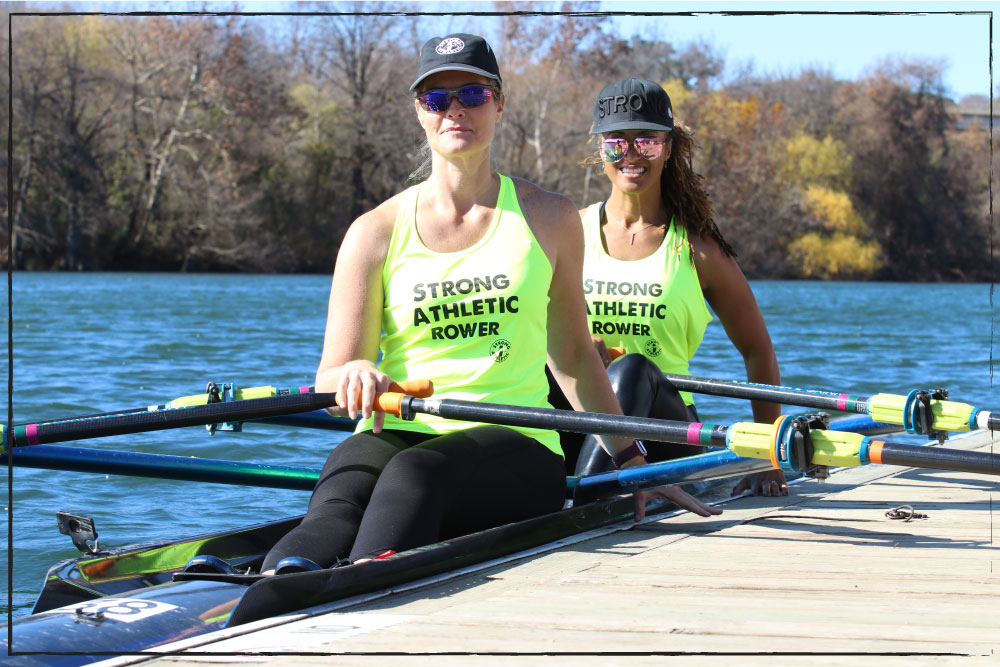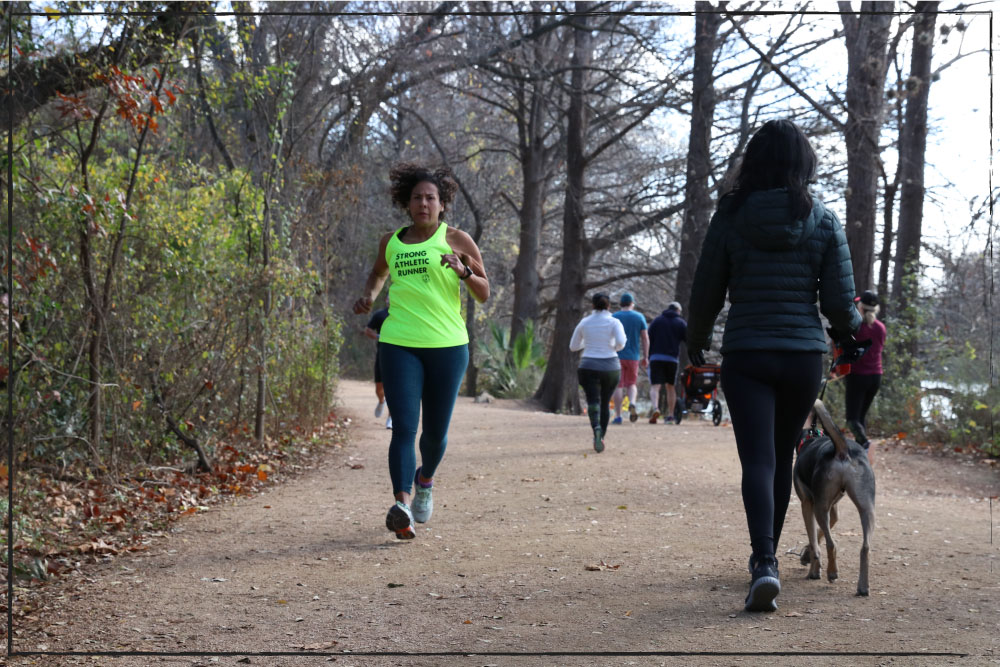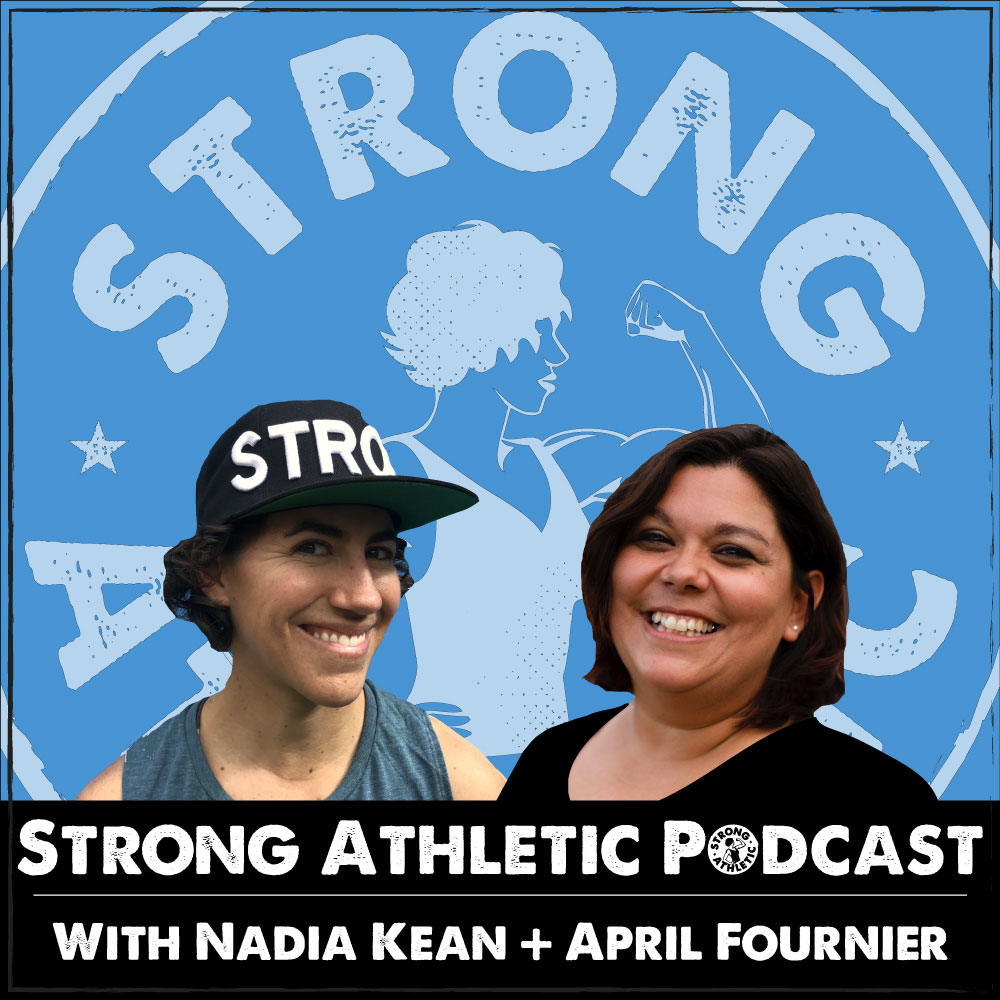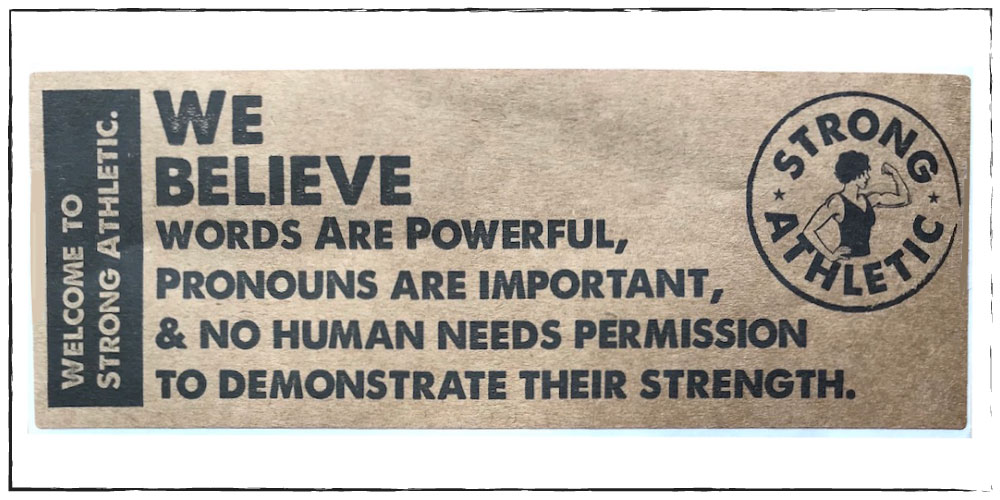Is Playing Sports Really that Great for You?
Posted by Nadia Kean on Dec 24th 2024
Is Playing Sports Really that Great for You?
One of our key goals at Strong Athletic is to help make sports more inclusive and open to all humans. One of the methods we use to keep the doors open between sports and humans is through affirmations. When you affirm something, you’re stating it as fact. At Strong Athletic we know that anyone, anywhere, regardless of anything, should be able to play and participate in sport.
Unfortunately, not everyone feels this way. Sometimes the people in charge of sports teams attempt to “weed out” those that don’t seem like they’re a good fit. Some people are taught at some point in their life that they’re not good at sports, and they are essentially “weeded out”. Many of these people never return to sports and start to think of themselves as unathletic.
Why Coaches Shouldn't Cut Athletes from their Team
According to one study on Physical Activity and Sports which was held in Sweden: “...Those who are excluded from sports feel mentally worse. As there is a relationship between depressive episodes in adolescence, and depression as adults, early exclusion has far-reaching consequences.” [1]
One of our goals at Strong Athletic is to get people into sports and also to help them stay in sports. Being the introspective company that we are, we’re constantly asking why this is a goal of ours and if it is a good goal? Why should people play sports, and once they are playing sports, why should they stay in sports? We don’t want to push sports onto people, but we do want sports to be there for people when they’re looking for a positive and active outlet in their lives.
What are the Top Benefits of Playing Sports?
Type into any search engine, “The benefits of playing sports,” and you’ll quickly get a long list of articles and facts related to the topic. My search engine found 231,000,000 articles that I could read on the topic. Combing through all that information would be a sport in itself. One of the articles that popped up is Physical Activity and Sports—Real Health Benefits: A Review with Insight into the Public Health of Sweden. In this article the researchers discuss the pros and cons of participating in sports and the key focus was how physical activity and playing sports impacted the general public of Sweden.
To break down this question of why we think (and the research proves) that people should be in sports, we should establish what sport is. A quick search for the definition of sport states:
Sport (noun) - an activity involving physical exertion and skill in which an individual or team competes against another or others for entertainment.
We’ll use that definition to get started, knowing that of course there are exceptions to every generalization. I’m going to base this post on my personal experience in sports, and I’m also going to cross compare what I’ve written with what the research found.
My Personal Story about Playing Sports as a Child
I started playing sports and being physically active at a very young age. One of my first memories is actually how blissful it felt to run as fast as I could through the playground during a game of chase. The memory is most likely no longer accurate as it’s from the age of 4, which was 35 years ago, but in that memory everyone is trying to catch me and they can’t because I’m running too fast. Growing up, I took so much pride in this memory; it felt great to know I was so fast and athletic. I didn’t play organized sports until I was 10, but before that my days were filled with riding bikes, running around the neighborhood, swimming in the pool at our apartment complex and roller skating. So much roller skating. Another favorite memory of mine from my childhood is wearing a bikini and setting up different courses to skate through the apartment complex, trying to skate as fast as possible and then repeating the whole process. I didn’t have a timer so I didn’t actually know how fast I was going, but I didn’t really care. I was just shooting for my own personal type of excellence. I’d categorize these memories as positive. I had fun, I was being physically active and I felt confident from building on my skill set and doing something I was good at.
The first negative memory I have in sports was missing the ball during a volleyball tournament when I was about 10 or 11. This boy named Hunter yelled at me as the ball hit the ground. He thought it was my fault and yelled something accusative at me. I felt so ashamed, and it also didn’t help that he’d been my boyfriend the year before and had never talked to me since we broke up. Oh, childhood love... But, that’s a different topic. When someone misses a ball, you have many options for what to say. The other option Hunter had was, “No problem, we’ll get it next time,” and then he could have given me one of those high-fives that college volleyball players give to each other after every play. I don’t think Hunter had that type of emotional maturity yet. I’d categorize that memory and that experience as negative. I took his criticism to heart, but lucky for me I continued to play sports.
Based on those few memories and then others as I got older, I’d say that my experience is in alignment with what the research finds. I did organized sports in middle school and high school. Nearly everyday after school I was doing some type of activity that was often physical. I didn’t get into drugs or drinking. I wasn’t having sex. I was simply playing sports with my friends. We always had the goal to win, but none of my coaches put so much pressure on us to be the best that we felt we had to perform or quit. I never felt devastated after a loss. The high school volleyball team was rather cut throat, but I never made it past freshmen year tryouts, so I didn’t experience what being on a team with a super competitive environment was like until later. It wasn’t until college rowing and then later on in roller derby that I started to feel what I would call, “The anguish for the glory”.
What Does Research Say about the Positive and Negative Aspects of Playing Sports
Let’s jump ahead to what the research says about the positive and negative aspects that athletes experience as a result of being on a sports team. I’ve included a few bullet points that I found the most pertinent to this post from the research done in Sweden.
- People active in sports have, in general, better health than those who do not participate in sports, because they are physically and mentally prepared for the challenges of sports, abilities that in many cases can be transferred to other parts of life [1].
- Sport’s main purposes are to promote physical activity and improve motor skills for health and performance and psychosocial development [1]. Participants also gain a chance to be part of a community, develop new social circles, and create social norms and attitudes. In healthy individuals, and patients with mental illness, sport participation has been shown to provide individuals with a sense of meaning, identity, and belonging [1].
- Most recent studies show that physical activity and exercise used as a primary, or secondary, processing method have significant positive effects in preventing or alleviating depressive symptoms and have an antidepressant effect in people with neurological diseases. Training and exercise improve the quality of life and coping with stress and strengthen self-esteem and social skills. Training and exercise also lessen anxiety in people who are diagnosed with an anxiety- or stress-related disease, improve vocabulary learning, memory, and creative thinking. [1]
- ...Sports for children and young people have future health benefits by reducing the risk of developing depression and depressive symptoms, as well as improved wellbeing throughout life.[1]
The article included a chart that listed the pros and cons of playing sports. It was reaffirming to read the list of what “research says” and compare it to my personal experience. I’ve listed a few of the positive and negative aspects below. To read and see the entire chart, click here. The list has three categories: Personal, Social and Physiological.
Positive and Negative Aspects with Sports at Any Age
Personal
Pros of Playing Sports
- Better self-esteem
- Better academic results
- Independence and responsibility
- Better discipline
- Lower alcohol consumption (in most sports)
- Less drugs
- Lower risk of school dropout
Cons of Playing Sports
- Emotional fatigue
- One-dimensional identity
- Fear of punishment
- Fear of failure
- Feeling pressure from the surroundings
- Fear of disappointing surroundings
- Risk of burnout
- Risk of self-sacrifice
- Risk of depression in case of rejection
Social
Pros of Playing Sports
- The usefulness of teamwork
- Larger contributions to society later in life
- Lower crime
- Easier to reach with education
Cons of Playing Sports
- Less integrated with the family
- Social isolation from other society
Physiological
Pros of Playing Sports
- Greater physical literacy
- Abilities to live a healthy life as adult and elderly
- Less smoking
- Less drugs
- Lower risk for fractures as older
Cons of Playing Sports
- Reduced general disease risk
- Physical fatigue
- Increased injury risk
- Risk of eating disorders
- Overtraining
- Risk of abuse (physical and mental)
- Unilateral training and development
If you played sports or you currently still play sports what from the list above can you identify with? What from the list above did you not experience as a result of playing sports?
As I previously mentioned, I used to talk about the “anguish for the glory” in regard to my experience playing sports, and more specifically playing roller derby. My most competitive years in sports was from the age of 30-35. My entire life revolved around being the absolute best at flat track roller derby and I based my sense of self on how my team was performing and also how I contributed to our wins or losses. For me personally, it seemed that I didn’t experience the “negative” side of being on a sports team until I got more competitive and had more on the line. Looking back, I gained a lot of confidence during that time, but I also did a lot of psychological damage as well. We’ll be touching on this a bit later when we discuss shame and guilt associated with exercise and sports.
If you’ve never played sports, what from the list above makes you excited to play sports? What makes you hesitant to play sports? I can imagine that certain benefits such as better self-esteem” and “academic results” would seem alluring, while the downsides such as “less integrated with the family” and “eating disorders” would make you rethink sports.
Are you reading this post from the perspective of a guardian or parent? If you’re wanting to get your child into sports, you’d probably want to take advantage of the pros such as “better discipline” or “less chance of dropping out”, but you will also want to avoid the cons such as “fear of failure” or “risk of eating disorders”. “
Are you reading this article as a coach or trainer? Which of the pros do you want to make sure the athletes on your team experience and how will you help to make it so the cons have less of an impact? Do you even have full control over the athletes’ experience on your team or does that control only go so far? Meaning, you can make sure to always treat the athletes with respect, so that you contribute to their “sense of self-esteem”, but at the end of the day, you can’t control how the athlete takes critical feedback.
Why do Elite Athletes Experience the Negative Aspects of Sports More?
If Strong Athletic is going to encourage people to participate in sports, we want to have a clear idea of how great sports can be in a person’s life and also how damaging they can be. We want to steer the people in our community toward things that will benefit them, but we also want to make sure that they know to be cautious. Ultimately if you’re able to reap the benefits while avoiding the downsides, that is the most ideal. For athletes at a certain elite level it gets harder to avoid the negative aspects of sport because the harder you train, the more you dedicate yourself to a singular goal and the more you commit your time, the more you have on the line. Losses become more of a big deal and are harder to shake off. When your identity becomes playing the sport and being an athlete in that sport, it becomes harder to separate your identity and sense of self from your performance. This isn’t so much of a problem when you’re winning, but when you’re losing that’s when you really feel the negative aspects of that loss.
For some people, they experienced too much of the downside of sports and so they leave sports, or they were never encouraged to play sports and they have categorized themselves as “not an athlete”. “Oh, I don’t play sports,” they say when asked, and then they tell you a long list of what they do to get exercise, which includes walking, running, hiking, swimming, yoga, random fitness classes at the gym. These people feel more comfortable with saying that they exercise, rather than saying that they play a sport.
Why do some People not use the Word Athlete?
This leads to my next question: is it okay that some people don’t claim the word athlete? They say that they don’t play sports, but rather they exercise? Is there a difference and does it even matter? We did an episode on this very topic on the Strong Athletic Podcast. Strong Athletic greatly believes that the words you use to describe yourself are highly personal. That’s why we continue to create designs that give people options for how they want to be perceived. For some people it takes courage to wear the words “Strong Athletic Runner” across their chests, even if they go running 5 times a week and are in fact strong, athletic and a runner. Last year we wanted to do a podcast episode exploring the word “athlete” and “unathletic” after a request came in for a shirt that said, “strong, unathletic…”. Is it diminishing to call yourself unathletic or does it all have to do with perception and whether you personally think that being athletic or unathletic is a positive or negative thing? Have a listen to the podcast episode and let us know what you think. To listen to that episode or to read the transcript, click here.
How is Doing Exercise Different from Playing Sports?
Wrapped into playing sports is exercise. Assuming you play a typical sport, while you play your sport, you are exercising. This means that you’re experiencing the physiological side of sports and all of the pros and cons that come along with exercise. So my question is: does exercise once removed from sports, have the same social and personal pros and cons that are experienced when playing a sport?
What is exercise? A search for the word exercise brings up the following:
Exercise (noun) - activity requiring physical effort, carried out to sustain or improve health and fitness.
What are 10 Benefits of doing Exercise?
Another quick search results in a ton of articles and websites committed to discussing exercise and the benefits of exercising. One article that came up was published by Heart Research UK [2], and includes a list of the psychological benefits that are gained through exercise. The list includes:
- Improved mood
- Reduced stress
- Improved ability to cope with stress
- Improved self-esteem
- Pride in physical accomplishments
- Increased satisfaction with oneself
- Improved body image
- Increased feelings of energy
- Improved confidence in your physical abilities
- Decreased symptoms associated with depression
What are 5 Reasons Exercise is Bad for you?
A less common search of “why exercise is bad for you” brought up a smaller number of articles that mainly study and sight the instances when people exercise too much. One such article titled “Top 10 Reasons Exercise is Bad For You” found on the website TrainingPeaks [3] has a list that includes reasons that even seem counterintuitive. That being said, there are some interesting downsides that they list, including:
- Exercise is Addictive
- Exercise is associated with body perception disorders
- Exercise can break up families
- Exercise is stressful
- Exercise causes premature aging.
Further reading results in similar lists and seems to point to the moment when people transition from being casual exercisers to more obsessive or compulsive exercisers. Over training, or developing negative habits that mirror addiction don’t seem to be part of the storyline for people who exercise casually mainly because they know it’s “good” for them.
Why do People Experience Shame Associated with Exercise?
There is of course the flip side to people who overtrain, and that’s people who have the intention to exercise or workout, but ultimately they don’t or they don’t meet the “goals” they have created for themselves. A quick search of, “guilt associated with not exercising” brought up numerous articles about this very topic, which is an indicator that it’s something that impacts a lot of people.
Related to this topic is the reason people feel that they need to exercise and then the backlash and shame they experience for not exercising. Having experienced feelings of shame and guilt related to exercise or not exercising I wasn’t surprised to find so many articles and research about how this problem impacts other people.
In an article written by University of Alberta professor Pirkko Markula Ph.D., featured on Psychology Today [4], Markula wrote about “exercise-related guilt”. Through her research she found that, “Whatever the activity level or fitness gains my participants had achieved, they felt they should be doing more. There was always some aspect of their health or fitness or body they could point to as not good enough.”
There are articles, blog posts and studies about people who feel exercise related shame and guilt, and the negative feelings were a result of not doing any exercise or feeling like the exercise they were doing was never enough. Rather than simply feeling pride on the days that people did exercise, they ended up feeling shame on the days that they didn’t exercise, or didn’t exercise enough.
When I first retired from competitive roller derby in 2018 I lost all interest in exercise. I didn’t realize how much my desire to be physically fit was directly correlated to my desire to perform at a high level. I started to feel guilty about not working out, but at the same time I just didn’t want to lift weights or go for runs. I remember leaving multiple fitness classes mid class feeling angry and agitated. The classes were actually annoying to me and seemed irrelevant. If I didn’t have anything to train for, my thinking was, what was the point?
Without meaning to, I was basing what the concept of my own athleticism was on the most competitive and elite years of my athletic career. This is problematic because most likely the type of training I did during that time and the achievements I accomplished are behind me. To move forward, I needed to reestablish what my personal concept of athletic was and I needed to be okay with that. Two years later, I still don’t find the same type of joy in exercise. There’s no longer the elation that a 5 mile run will get me one step closer to my derby goals, but in its place is the knowledge that a 3 mile run today will make it so that if sustained over the years, I’ll remain mobile and healthy well into my 70s and 80s.
Should you Encourage your Friends, Family, Kids and Parents to Play Sports?
Going back to my initial question at the beginning of this post: should we be encouraging people to participate in sports and stay in sports? If people would rather not be part of a team is exercise just as good? How about the perception of the word athlete? Does using the noun to describe yourself do you more good than harm?
What the studies seem to say is that playing sports is good, but it does have factors that make it so that participation does have downsides. If you’re aware of what the potential risks are, you’ll be better equipped to address them if they should come up.
How Much Exercise is Enough each Week? How Much Exercise is too Much?
How about exercise? Is it good for you? Generally speaking, it seems that all studies point to “yes!” you should exercise at least 150 minutes per week at a moderate level. However, like participating in sports, there are downsides that are associated with being too active and developing an addiction to exercise that can put your body and brain at risk for long term adverse effects. Again, awareness of these factors seems to be the first step in preventing them.
Who gets to use the Word Athlete?
In regard to using words like “athlete”, “athletic”, “strong”, “unathletic” and if you should or should not, language is highly personal and it really should be up to each individual which words they use to describe themselves. Strong Athletic sends a simple sticker with every order we send out that says, “We believe words are powerful, pronouns are important and no human needs permission to demonstrate their strength”. We created this sticker, which we call the “We Believe” sticker because we truly believe it’s messaging. Only you get to decide who you are and what you stand for. You never need permission from others when choosing the words that describe you. If you want to be an athlete, but you don’t “look like” a “typical” athlete, guess what? It doesn’t matter, you’re an athlete as soon as you say you are. You never need other people’s permission. Never. It makes me think of this saying, “It’s none of my business what other people think about me”. And it’s true.
This blog post is of course an opinion piece that is based on my personal experience in sports as both an athlete and a coach, and also on research done by different academic groups and people involved in the sports and exercise world. The intention of this post is to make you think about things that you deeply believe in and then study them to see if they are true or not. I believe that people should play sports, exercise and use words like “athlete” and “athletic” to describe themselves, but just because I believe it doesn’t mean that it’s a good suggestion. In this case, as we’ve stated previously, it seems like it is a good suggestion as long as you stay aware and stop to think when you no longer feel good.
Will Strong Athletic continue to encourage people to play sports? Yes. We believe the upside of being on a sports team and playing sports outweighs the negative aspects of sports. If you want to share your own athletic story or experience with sports and exercise, we’d love to hear from you. Please write to us at hello@strongathletic.com and we’ll write back to you after we read what you’ve written.
Thanks so much for reading my post and remember, you don’t need anyone’s permission to demonstrate your strength. You are Strong Athletic.
1. Christer Malm, Johan Jakobsson and Andreas Isaksson, Physical Activity and Sports- Real Human Benefits: A Review with Insight into the Publich Healther of Sweden. NCBI, published May 23, 2019. Link to Article
2. Psychological and Social Benefits of Exercise, last updated on Sept 8, 2016. Link to Article
3. Top Ten Reasons Exercise is Bad for You. Link to Article
4. Pirkko Markula, Ph.D. Feeling Exercise Guilt? Is Guilt a Motivator or Immobilizer? Published Feb 9, 2015. Link to Article
Keywords: is exercise good for you, pros and cons of being on a sports team, pros and cons of exercise, who can use the word athletic, is unathletic a word, top 10 reasons to put your child in sports, 10 ten reasons to keep your child out of sports, how can coaches help keep athletes positive, the toxic side of sports, the negative aspects of sports, overtraining in sports, overtraining and exercise, the toxic side of exercise, can exercise be bad for you?, can playing on a sports team be bad for you?, Can playing on a sports team be bad for your young child?, why do people feel guilty for not exercising?, why do people feel guilty for not working out?






